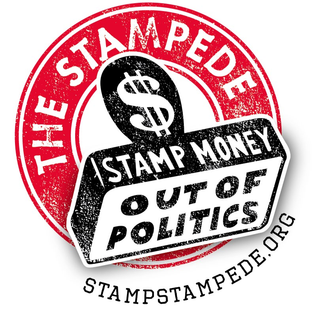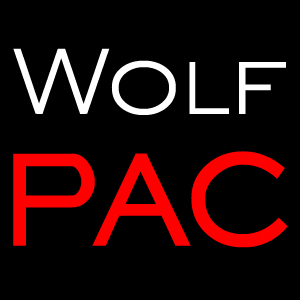Crony capitalism, sometimes also called simply cronyism, is a pejorative term used in political discourse to describe a situation in which businesses profit from a close relationship with state power, either through an anti-competitive regulatory environment, direct government largesse, and/or corruption. Examples given for crony capitalism include obtainment of permits, government grants, tax breaks, or other undue influence from businesses over the state's deployment of public goods, for example, mining concessions for primary commodities or contracts for public works. In other words, it is used to describe a situation where businesses thrive not as a result of free enterprise, but rather collusion between a business class and the political class.
Campaign finance laws in the United States have been a contentious political issue since the early days of the union. The most recent major federal law affecting campaign finance was the Bipartisan Campaign Reform Act (BCRA) of 2002, also known as "McCain-Feingold". Key provisions of the law prohibited unregulated contributions to national political parties and limited the use of corporate and union money to fund ads discussing political issues within 60 days of a general election or 30 days of a primary election; However, provisions of BCRA limiting corporate and union expenditures for issue advertising were overturned by the Supreme Court in Federal Election Commission v. Wisconsin Right to Life.

Lester Lawrence Lessig III is an American legal scholar and political activist. He is the Roy L. Furman Professor of Law at Harvard Law School and the former director of the Edmond J. Safra Center for Ethics at Harvard University. He is the founder of Creative Commons and of Equal Citizens. Lessig was a candidate for the Democratic Party's nomination for president of the United States in the 2016 U.S. presidential election but withdrew before the primaries.
A publicly funded election is an election funded with money collected through income tax donations or taxes as opposed to private or corporate funded campaigns. It is a policy initially instituted after Nixon for candidates to opt into publicly funded presidential campaigns via optional donations from tax returns. It is an attempt to move toward a one voice, one vote democracy, and remove undue corporate and private entity dominance.
A convention to propose amendments to the United States Constitution, also referred to as an Article V Convention, state convention, or amendatory convention is one of two methods authorized by Article Five of the United States Constitution whereby amendments to the United States Constitution may be proposed: on the Application of two thirds of the State legislatures the Congress shall call a convention for proposing amendments, which become law only after ratification by three-fourths of the states. The Article V convention method has never been used; but 33 amendments have been proposed by the other method, a two-thirds vote in both houses of Congress; and 27 of these have been ratified by three-fourths of the States. Although there has never been a federal constitutional convention since the original one, at the state level more than 230 constitutional conventions have assembled in the United States.
Electoral reform in the United States refers to efforts to change American elections and the electoral system used in the United States.
Citizens United v. Federal Election Commission, 558 U.S. 310 (2010), is a landmark decision of the Supreme Court of the United States regarding campaign finance laws and free speech under the First Amendment to the U.S. Constitution. The court held 5–4 that the freedom of speech clause of the First Amendment prohibits the government from restricting independent expenditures for political campaigns by corporations, nonprofit organizations, labor unions, and other associations.

Republic, Lost: How Money Corrupts Congress—and a Plan to Stop It is the sixth book by Harvard law professor and free culture activist Lawrence Lessig. In a departure from the topics of his previous books, Republic, Lost outlines what Lessig considers to be the systemic corrupting influence of special-interest money on American politics, and only mentions copyright and other free culture topics briefly, as examples. He argued that the Congress in 2011 spent the first quarter debating debit-card fees while ignoring what he sees as more pressing issues, including health care reform or global warming or the deficit. Lessig has been described in The New York Times as an "original and dynamic legal scholar."

The 99 Percent Declaration or 99% Declaration is a not-for-profit organization based in Kentucky that originated from a working group of the Occupy Wall Street (OWS) movement in Zuccotti Park, New York City, in October 2011. The organization published a document calling for a "National General Assembly" to be held beginning the week of July 4, 2012 in Philadelphia, which was rejected by the general assemblies of OWS and Occupy Philadelphia. The Declaration includes demands for an immediate ban on all monetary and gift contributions to all politicians, implementation of a public financing system for political campaigns, and the enactment of an amendment to the United States Constitution overturning the Supreme Court's Citizens United v. FEC decision.
The calling of a Second Constitutional Convention of the United States is a proposal made by some academics and activists from across the political spectrum for the purpose of making substantive reforms to the federal government of the United States by rewriting the U.S. Constitution.

Move to Amend is a national, non-partisan, grassroots organization that seeks to blunt corporate power by amending the United States Constitution to end corporate personhood and state that money is not speech. The group was created in response to the 2010 Supreme Court ruling Citizens United v. Federal Election Commission, which held that corporations have a First Amendment right to make expenditures from their general treasuries supporting or opposing candidates for political office, arguing that the Court's decision disrupts the democratic process by granting disproportionate influence to the wealthy. Move to Amend advocates for the "We the People" Amendment, currently in Congress as H.J.Res. 48, to establish that constitutional rights are reserved for natural persons only and require the regulation and disclosure of spending in U.S. elections.
Rootstrikers is a nonpartisan grassroots activist organization run by Demand Progress and created by Harvard Law School professor Lawrence Lessig and political activist Joe Trippi for the purpose of fighting political corruption in the United States and reducing the role of special interest money in elections. According to Lessig, the idea is not to hack at the branches of the problem but rather focus on its root, which Lessig views as a corrupt campaign finance system, and hence he named the organization rootstrikers.

Stamp Stampede is a grassroots campaign mobilizing people across the United States to stamp messages on American currency in support of passing a constitutional amendment to Get Money Out of Politics. Ben Cohen, the co-founder of Ben & Jerry's ice cream, spearheaded the campaign. They promote stamping through the distribution of rubber stamps, public stamping activities and national tours in the Stamp Mobile. The rubber stamps include different messages, such as: "Money is not free speech," "Not to be used for bribing politicians," "Corporations are not people; amend the Constitution," and "The system isn’t broken, it's fixed."

Moneyocracy is a 2012 documentary film about Citizens United v. Federal Election Commission, 558 U.S. 310 (2010), which was a landmark United States Supreme Court case in which the Court held that the First Amendment prohibited the government from restricting independent political expenditures by corporations and unions. The film explores how the Citizens United v. Federal Election Commission decision has dramatically changed the U.S. Campaign Finance Laws and lead to the most expensive Elections in the United States. The film describes the systemic corruption of the United States democracy and the consequences of that systemic corruption on the U.S. democracy and the electorate.

Wolf-PAC is an American nonpartisan political action committee formed in 2011 with the goal of adding an "amendment to the United States Constitution to ensure balance, integrity, and transparency to our national system of campaign finance".

Citizens for Self-Governance (CSG) is a conservative American nonprofit political organization. In 2015, it launched a nationwide initiative calling for a convention to propose amendments to the United States Constitution to reduce federal spending. The group's efforts are focused on imposing fiscal restraint on Washington D.C., reducing the federal government's authority over states, and imposing term limits on federal officials. As of 2024, the organization's resolution had passed in 19 states. A total of 34 states would need to pass such a resolution in order for a Convention to Amend the Constitution to be called per Article V. The organization funded and won a class action lawsuit against the Internal Revenue Service over the agency's politically oriented targeting of conservative organizations. The group is based in Austin, Texas.

The 2016 presidential campaign of Lawrence Lessig, a law professor at Harvard University and cofounder of Creative Commons, was formally announced on September 6, 2015, as Lessig confirmed his intentions to run for the Democratic Party's nomination for President of the United States in 2016. Lessig had promised to run if his exploratory committee raised $1 million by Labor Day, which it accomplished one day early. He described his candidacy as a referendum on campaign finance reform and electoral reform legislation.

The Citizen Equality Act of 2017 is a draft piece of legislation proposed by former 2016 American presidential candidate Lawrence Lessig. The act was the centerpiece of Lessig's campaign platform, encompassing his plans to improve political equality including campaign finance reform, expansion of voting access, and revised districting laws. Lessig had stated that if elected, he would make these reforms the first priority of his presidency. At the start of his campaign, he announced his candidacy as a "referendum," stating that he would step down upon the enactment of the Citizen Equality Act and turn the presidency over to the vice president. In an October 2015 interview on HBO's Real Time with Bill Maher, he retracted this statement and expressed his intention to stay on as president if elected. On November 2, 2015, Lessig ended his bid for the presidency, citing changes in Democratic Party rules that excluded him from the stage during televised debates.
A campaign finance reform amendment refers to any proposed amendment to the United States Constitution to authorize greater restrictions on spending related to political speech, and to overturn Supreme Court rulings which have narrowed such laws under the First Amendment. Several amendments have been filed since Citizens United v. Federal Election Commission and the Occupy movement.

The National Progress Party of Armenia is a political party in Armenia, founded on 3 October 2018, by a group of political activists following the 2018 Armenian Velvet Revolution.












